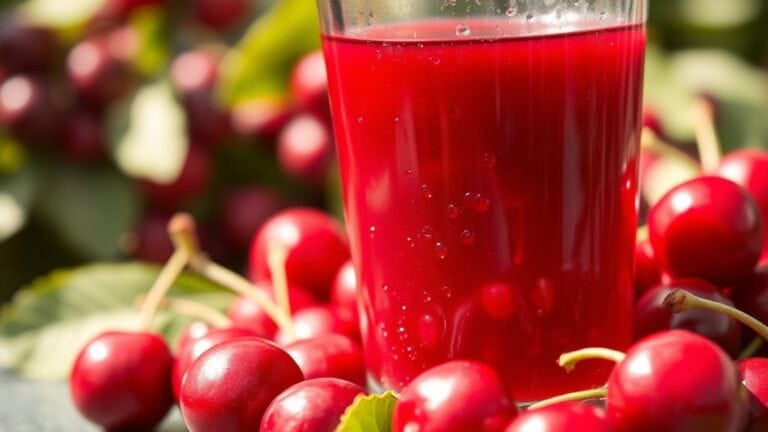Agave nectar is like nature’s smooth talker it sweetens your day without the guilt trip. Suppose one has ever pondered whether there’s a better way to satisfy your sweet tooth, this golden syrup could just be your answer. Unlike refined sugar, it sidesteps blood sugar spikes while packing in benefits you wouldn’t expect from something so delicious. From supporting digestion to easing inflammation, agave has tricks up its sleeve. Wait until you observe what else it can do.
Low Glycemic Index for Better Blood Sugar Control
Should you be seeking a sweetener that won’t send your blood sugar on a rollercoaster, agave could be your optimal choice. With a glycemic index (GI) as low as 10–27—far below white sugar’s 63—this natural sweetener causes a slower, steadier rise in blood sugar levels. That’s because its sugars decompose gradually, avoiding the sudden spikes higher-GI sweeteners trigger.
In the event that you’re managing diabetes or just aiming for stable energy, agave’s low GI makes it a wiser swap. You’ll also bypass the crash-and-crave cycle, since it keeps blood sugar balanced longer. Plus, its mild taste blends easily into drinks or recipes.
Just remember: moderation matters. While it’s gentler on blood sugar, it’s still sweet—so use it prudently to keep your health goals on track.
Rich in Antioxidants for Cellular Protection
You can boost your immune system with agave’s antioxidants, which help your body fight off illness. These compounds also shield your cells from oxidative stress damage caused by free radicals.
Agave’s phytochemicals, like flavonoids, act as your body’s defense team against harmful invaders.
Boosts Immune System Function
Agave nectar often gets praised for its natural sweetness, but it’s also packed with antioxidants that give your immune system a boost. Its antioxidant properties come from plant compounds like saponins, which help strengthen immune system function by fighting off harmful invaders.
These saponins have anti-inflammatory effects, easing stress on your body’s defenses. While agave isn’t a vitamin powerhouse, its polyphenols and flavonoids still offer cellular protection, keeping your immune response sharp. Compared to refined sugars, agave’s natural compounds make it a smarter choice for supporting overall health.
Just as you remember, moderation is key—its benefits shine when used wisely. So next time you sweeten your tea or yogurt, consider agave for a little extra immune love.
Fights Oxidative Stress Damage
Many natural sweeteners offer more than just flavor—agave syrup packs a powerful punch against oxidative stress thanks to its rich antioxidant content. It contains saponins, unique antioxidant compounds that help neutralize free radicals, the unstable molecules that damage your cells. Whenever free radicals build up, they cause oxidative stress, which can lead to inflammation and even chronic diseases.
Agave’s polyphenols, like flavonoids, work hard to protect your DNA and keep your cells healthy. Studies show it has 1.6 times more antioxidant power than honey, making it a smart swap for other sweeteners. By adding a little agave to your diet, you’re giving your body extra defense against cellular damage. Regard it as a sweet way to stay healthier—without sacrificing taste.
Contains Phytochemicals Vs Free Radicals
Beyond fighting oxidative stress, agave’s phytochemicals actively combat free radicals that threaten your cells. This natural sweetener contains saponins, plant compounds that act as antioxidants, helping to neutralize harmful molecules before they damage your body.
While agave isn’t a superfood, its modest antioxidant content offers some health benefits compared to refined sugar. These compounds support immune function and could reduce inflammation, giving your cells extra protection. Contemplate it as a small but helpful shield against daily wear and tear.
Just recall, agave’s perks are subtle—don’t overdo it. Enjoy it as part of a balanced diet, and let its natural properties work quietly in the background. It’s a sweeter choice with a little extra care built in.
Natural Anti-Inflammatory Properties
Believe, may, whether, if you, could, recollect, might, addressing
Few things feel more frustrating than handling stubborn inflammation, but nature could offer some relief through compounds like those found in agave. The plant’s saponins act as natural anti-inflammatory agents, potentially easing discomfort by reducing oxidative stress. These compounds may help calm your body’s overactive responses, which is great whether you’re addressing chronic issues.
Plus, agave’s low glycemic index means it won’t spike your blood sugar—a common trigger for inflammation. While more research is needed, swapping refined sugars for agave could be a small step toward a gentler diet. Just recollect, moderation is key. Believe of it as a sweetener with a bonus: it might help you feel better while still satisfying your sweet tooth.
Supports Digestive Health With Prebiotic Effects
Agave assists your gut by packing prebiotic fiber that nourishes the beneficial bacteria in your system. It can alleviate digestion and could even calm issues like irritable bowel syndrome.
You’ll also assimilate more calcium and other nutrients when your gut’s content with agave.
Encourages Healthy Gut Flora
Some plant-based foods naturally help your gut thrive, and agave is one of them. The agave plant contains inulin, a prebiotic fiber that feeds the good bacteria in your gut microbiome. These friendly microbes, like Bifidobacterium and Lactobacillus, flourish when you consume agave, boosting your gut health.
A balanced gut microbiome means better digestion, improved nutrient absorption, and fewer digestive issues. Plus, agave’s low glycemic index prevents blood sugar spikes that can upset your gut’s delicate balance. By adding agave to your diet, you’re giving your gut the tools it needs to stay diverse and strong. Ponder it as a sweetener that does more than just taste good—it supports your whole digestive system from the inside out.
Boosts Prebiotic Fiber Content
Because your gut thrives on the right kind of fuel, agave’s inulin—a powerful prebiotic fiber—gives those good bacteria exactly what they need to flourish. This natural sweetener doesn’t just satisfy your sweet tooth; it feeds your gut microbiome, helping probiotic bacteria like bifidobacteria and lactobacilli grow stronger.
A healthier gut means better digestive health, fewer bloating episodes, and a more balanced system overall.
- Feeds good bacteria: Inulin acts like fertilizer for probiotic bacteria, helping them multiply and outcompete harmful microbes.
- Supports gut diversity: A varied gut microbiome is linked to better digestion and even mood regulation.
- Eases discomfort: By promoting a balanced gut, agave can reduce symptoms like irregularity or mild stomach upset.
Aids in Digestion Process
Your digestive system gets a silent hero as agave steps in—its prebiotic effects don’t just ease digestion but actively strengthen it from the inside out. The fructans in agave feed your gut bacteria, helping good bugs like Bifidobacterium and Lactobacillus thrive. These tiny allies deconstruct food, reduce inflammation, and even boost nutrient absorption.
| How Agave Helps Digestion | What It Does | Why It Matters |
|---|---|---|
| Feeds gut bacteria | Supports probiotic growth | Balances microbiome |
| Ferments into short-chain fatty acids | Nourishes intestinal lining | Reduces bloating |
| Alleviates IBS symptoms | Soothes digestive tract | Improves comfort |
You’ll notice less discomfort and better regularity as agave’s prebiotics work their magic. It’s like giving your gut a cozy home where everything runs smoothly. Just recollect—moderation keeps the benefits coming without overloading your system.
Vegan-Friendly Alternative to Honey
Here’s why agave shines as a honey alternative:
- Ethically sourced: Made from the agave plant, it doesn’t involve bees, aligning with vegan principles.
- Mild taste: Its neutral flavor works in teas, baked goods, or dressings without overpowering.
- Health-conscious choice: The slower sugar absorption helps manage energy levels better than honey.
Whether you’re vegan or just exploring alternatives, agave offers sweetness without the guilt.
Enhances Flavor Without Overpowering Taste
You’ll love how agave subtly sweetens your food without stealing the spotlight. Its neutral taste blends seamlessly with other ingredients, keeping flavors balanced and harmonious.
Whether you’re baking or cooking, a little goes a long way to amplify your dish without overpowering it.
Subtle Sweetness Profile
Agave’s subtle sweetness makes it a standout sweetener, blending seamlessly into recipes without stealing the spotlight. Its syrup has a nuanced flavor that bolsters drinks, desserts, and even savory dishes without overwhelming them. Since it’s 1.5 times sweeter than sugar, you’ll use less to achieve the same effect, making it a smarter choice for balanced sweetness.
- Gentle on taste buds: Its mild flavor won’t mask other ingredients, letting natural tastes shine.
- Lower glycemic index: Unlike sugar, it causes a slower rise in blood sugar, avoiding sudden spikes.
- Versatile in recipes: From smoothies to marinades, it adapts without clashing with other flavors.
You’ll love how it elevates dishes while keeping things light and balanced.
Balanced Culinary Companion
That mild sweetness in agave doesn’t just make it a better sugar substitute—it also lets it blend effortlessly into dishes without taking over. As a natural sweetener, its subtle flavor amplifies everything from baked goods to savory marinades without masking other ingredients. You’ll need less of it, too, since it’s about 1.5 times sweeter than sugar.
Its low glycemic index means it won’t spike your blood sugar like table sugar, making it a wiser choice for balanced eating. Plus, it’s versatile in cooking—try drizzling it over yogurt, stirring it into dressings, or using it in glazes for meats. Whether you’re baking or grilling, agave keeps flavors harmonious while adding just the right touch of sweetness. It’s the kind of ingredient that helps, never hijacks.
Neutral Taste Harmony
- No flavor fights: It won’t overpower herbs, spices, or citrus, so your recipes stay balanced.
- Sweetness control: Its mild taste means you can adjust sweetness without throwing off the dish’s harmony.
- All-purpose use: Works in teas, sauces, or baked goods because it adapts, never dominates.
Agave’s magic lies in its ability to boost, not overwhelm. Whether you’re dressing a salad or frosting a cake, it keeps flavors smooth and cohesive.
May Aid in Weight Management
Should you be attempting to manage your weight, agave could be a beneficial addition to your diet. Its low glycemic index (GI) means it releases sugar gradually, preventing spikes that lead to cravings and weight gain. Unlike refined sugar, agave’s intense sweetness enables you to use less, cutting calories without sacrificing taste.
While some worry fructose causes increased fat storage, agave’s natural compounds, like saponins, might actually curb appetite and reduce overeating. Plus, its anti-inflammatory properties could support metabolism, lowering risks tied to heart disease. Swap sugary drinks or desserts with agave-sweetened alternatives to ease into healthier habits.
Recollect, moderation matters—even natural sweeteners add calories. Pair it with balanced meals and activity for the best results. Small changes, like this swap, can make weight management feel simpler.
Contains Trace Minerals for Added Nutrition
- Iron & Calcium: Supports bone health and energy levels, even in small amounts.
- Magnesium & Potassium: Assists with muscle function and hydration balance.
- Zinc & Copper: Boosts immunity and metabolic processes subtly.
While you won’t meet daily needs with agave alone, every bit counts upon swapping out empty-calorie sugars. It’s a smarter sweetener choice for those mindful of added nutrition.
Gentle on Teeth Compared to Refined Sugar
Unlike refined sugar, which wreaks havoc on your teeth by fueling decay-causing bacteria, agave offers a gentler alternative. This sweetener derived from the agave plant has a low glycemic index (GI), meaning it doesn’t spike your blood sugar levels like white sugar does.
Since harmful oral bacteria thrive on sugar, agave’s slower absorption helps protect your dental health. It’s also less acidic, reducing the risk of enamel erosion. While no sweetener is entirely cavity-proof, swapping refined sugar for agave in moderation can be a smarter choice for your smile. Just recollect, brushing and flossing still matter—agave isn’t a free pass, but it’s a step toward healthier teeth. Small changes like this add up, so your mouth will thank you.
Versatile for Cooking and Baking Applications
Agave isn’t just easier on your teeth—it’s also a kitchen superstar that adapts to nearly any recipe. Its neutral flavor and syrupy texture make it a healthier swap for sugar or honey in baked goods, dressings, or even cocktails. Since it has a low glycemic index (GI), it won’t spike your blood sugar levels like refined sugars do.
Here’s why agave shines in your kitchen:
- Baking Buddy: Use it in muffins, cookies, or cakes for a smoother sweetness without the grit of sugar.
- Marinade Magic: Its liquid form blends perfectly into sauces and glazes for meats or veggies.
- No-Bake Wins: Drizzle it over yogurt or mix into energy bars—it stays stable without heating.
Whether you’re whipping up breakfast or dinner, agave keeps things simple and sweet.
Conclusion
Funny how something so sweet can be so good for you, right? Agave isn’t just a sugar swap—it’s a multitasker. It keeps your blood sugar steady, soothes your gut, and even fights inflammation. Whether you’re drizzling it on pancakes or stirring it into tea, you’re giving your body a little extra love. Who knew a sweetener could do all that? Next time you reach for sugar, consider—agave’s got your back.





